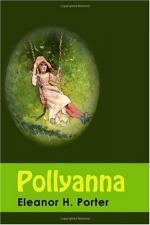The little room was cooler now, and the air blew in fresh and sweet. Outside, the birds were twittering joyously, and Pollyanna flew to the window to talk to them. She saw then that down in the garden her aunt was already out among the rosebushes. With rapid fingers, therefore, she made herself ready to join her.
Down the attic stairs sped Pollyanna, leaving both doors wide open. Through the hall, down the next flight, then bang through the front screened-door and around to the garden, she ran.
Aunt Polly, with the bent old man, was leaning over a rose-bush when Pollyanna, gurgling with delight, flung herself upon her.
“Oh, Aunt Polly, Aunt Polly, I reckon I am glad this morning just to be alive!”
“PollyANNA!” remonstrated the lady, sternly, pulling herself as erect as she could with a dragging weight of ninety pounds hanging about her neck. “Is this the usual way you say good morning?”
The little girl dropped to her toes, and danced lightly up and down.
“No, only when I love folks so I just can’t help it! I saw you from my window, Aunt Polly, and I got to thinking how you weren’t a Ladies’ Aider, and you were my really truly aunt; and you looked so good I just had to come down and hug you!”
The bent old man turned his back suddenly. Miss Polly attempted a frown—with not her usual success.
“Pollyanna, you—I Thomas, that will do for this morning. I think you understand—about those rose-bushes,” she said stiffly. Then she turned and walked rapidly away.
“Do you always work in the garden, Mr.—Man?” asked Pollyanna, interestedly.
The man turned. His lips were twitching, but his eyes looked blurred as if with tears.
“Yes, Miss. I’m Old Tom, the gardener,” he answered. Timidly, but as if impelled by an irresistible force, he reached out a shaking hand and let it rest for a moment on her bright hair. “You are so like your mother, little Miss! I used ter know her when she was even littler than you be. You see, I used ter work in the garden—then.”
Pollyanna caught her breath audibly.
“You did? And you knew my mother, really—when she was just a little earth angel, and not a Heaven one? Oh, please tell me about her!” And down plumped Pollyanna in the middle of the dirt path by the old man’s side.
A bell sounded from the house. The next moment Nancy was seen flying out the back door.
“Miss Pollyanna, that bell means breakfast—mornin’s,” she panted, pulling the little girl to her feet and hurrying her back to the house; “and other times it means other meals. But it always means that you’re ter run like time when ye hear it, no matter where ye be. If ye don’t—well, it’ll take somethin’ smarter’n we be ter find anythin’ ter be glad about in that!” she finished, shooing Pollyanna into the house as she would shoo an unruly chicken into a coop.




